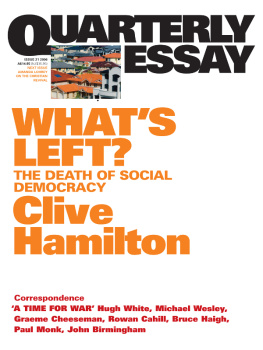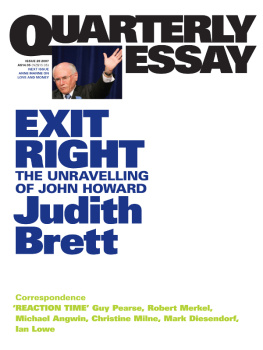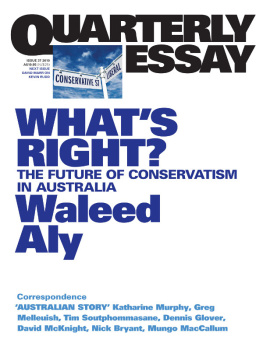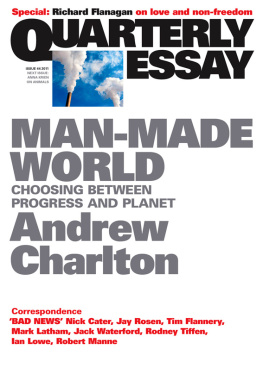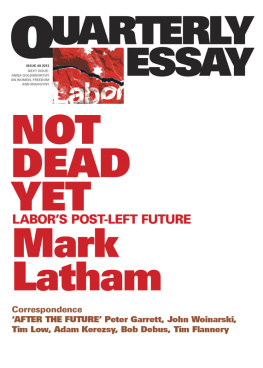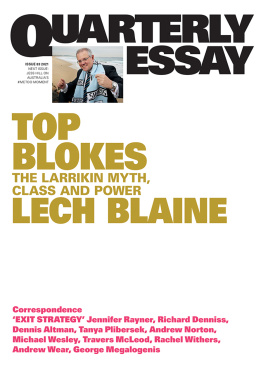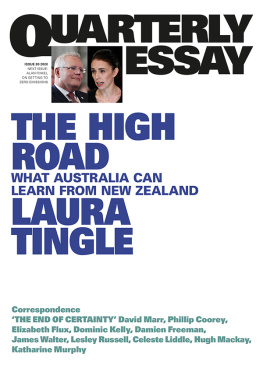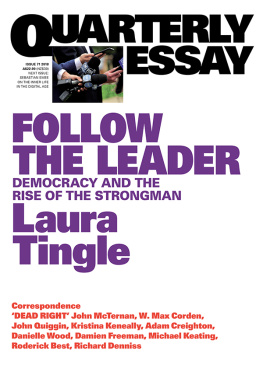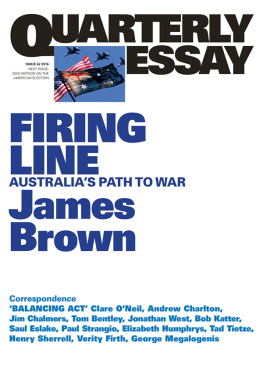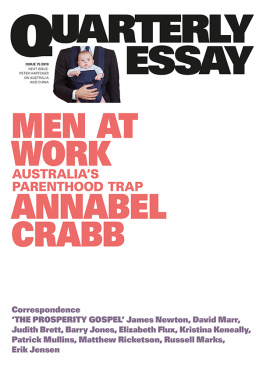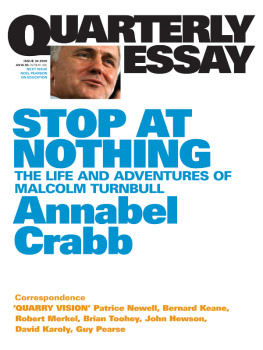Quarterly Essay is published four times a year by Black Inc., an imprint of Schwartz Publishing Pty Ltd.
Publisher: Morry Schwartz.
ISBN 9781925435887 ISSN 1832-0953
ALL RIGHTS RESERVED.
No part of this publication may be reproduced, stored in a retrieval system, or transmitted in any form by any means electronic, mechanical, photocopying, recording or otherwise without the prior consent of the publishers.
Essay & correspondence retained by the authors.
Subscriptions 1 year print & digital
(4 issues): $79.95 within Australia incl. GST.
Outside Australia $119.95. 2 years print & digital
(8 issues): $149.95 within Australia incl. GST.
1 year digital only: $49.95.
Payment may be made by Mastercard or Visa, or by cheque made out to Schwartz Publishing. Payment includes postage and handling.
To subscribe, fill out and post the subscription card or form inside this issue, or subscribe online:
www.quarterlyessay.com
Phone: 61 3 9486 0288
Correspondence should be addressed to:
The Editor, Quarterly Essay
Level 1, 221 Drummond Street
Carlton VIC 3053 Australia
Phone: 61 3 9486 0288 / Fax: 61 3 9011 6106
Email:
Editor: Chris Feik. Management: Caitlin Yates.
Publicity: Anna Lensky. Design: Guy Mirabella.
Assistant Editor: Kirstie Innes-Will. Production
Coordinator: Hanako Smith. Typesetting: Tristan Main.
MORAL
PANIC 101 | Equality, Acceptance and the Safe Schools Scandal |
Benjamin Law |
A LITTLE LIFE
What makes a thirteen-year-old kill himself?
It was November 2016 in Guangzhou, China, and I found myself asking this question after reading the news from home. Reports were coming in that a kid named Tyrone Unsworth had taken his life in my home state of Queensland. I call him a kid for a reason: Unsworth had barely hit his teens. Photographs showed a fair, freckly, curly-haired boy, a sassy moppet who danced and worshipped at the twin altars of Gaga and Beyonc. Those who knew him told me later that he was the kid doing cartwheels at lunch; the sensitive one whod tell his teachers, to their faces, that he loved them. For anyone to take their life that young is gutting, but what really got me was how his mother raged that Unsworth had been bullied to death for being gay. The Courier-Mail ran a heart-bruising headline that day: Mums anguish: They ended up getting him.
Unsworths suicide was front-page news in the state. The story was splashed across the ABC, News Corps metro titles and Fairfaxs Brisbane Times. It ran on TV news bulletins across the country and was featured on the ABCs 7.30 and international outlets in the following weeks. Curiously, though, the story didnt run in the Australian, the countrys only national broadsheet. In fact, the Australian would never run a single word about Unsworths death.
My mind wandered back to the first time Id set foot in mainland China, half a decade ago, when Id spent months interviewing young gay women and men in Beijing for a book chapter. There was a lesbian who didnt even know the word for gay until adulthood; a man whod been overprescribed antidepressants as a teenager to cure him of homosexuality; gay men and women whod held elaborate sham weddings to fool parents into thinking they were straight. Many told me about the times theyd considered or tried killing themselves. When the book came out, the most common response was pity. Poor China. So backward for queers, especially compared to Australia. Yet here we were.
Another Australian at the Guangzhou conference was the writer Melissa Lucashenko. Like me, Lucashenko is queer and from Queensland; like Unsworth, shes Indigenous. For queer Indigenous Australians, Unsworths suicide was felt even more keenly.
That day, Lucashenko and I sought each other out.
Did you read the news?
Christ, poor kid.
Apparently he was gay.
Thirteen years old, too.
The unspoken thought hovered between us: imagine wanting to kill yourselfat that age.
Thing is, we probably could.
It might seem self-centred and disingenuous, a performance of false intimacy, to grieve for someone youve never met. But if you grew up queer in Australia, Tyrone Unsworths suicide felt personal. At Unsworths age, I attended a school where as in most Australian schools, Id venture being gay was one of the worst things you could be. Some would argue it is the worst. After all, it still has the strange honour of being the only identity ascribed to anything in the schoolyard deemed to be shit.
If you grew up queer in Queensland, your experience was likely tougher still. After New South Wales decriminalised homosexuality in 1984, Queensland dug in its heels the year after and attempted to pass an amendment to the Liquor Act banning bars from serving perverts and deviants. Earning its reputation as Australias Deep North, it was the last mainland state to make gay sex legal.
Every push for the protection of queers in Australia has been accompanied by a jeering soundtrack of loathing. For some commentators, howling down queer activists is something of a family tradition. In 1994 columnist Frank Devine wrote in the Australian of Tasmanian efforts to decriminalise gay sex, that one must deplore the arrogance and meretriciousness of the effort by homosexuals to have [these laws] rescinded. A generation later, his daughter Miranda would take it up a notch in News Corp metro newspapers, advising marriage equality activists to take our olive branch and shove it where the sun dont shine.
In all of this, kids were assumed to be off-limits. However, by the time Unsworth killed himself, the Australian was in its tenth consecutive month of indefatigable, sustained coverage and criticism of Safe Schools Coalition Australia, a federally funded program launched in 2014 to support lesbian, gay, bisexual, transgender, intersex and queer school students. SSCA was inexpensive $8 million over three years (by contrast, the National School Chaplaincy Programme cost $243.8 million over four years) and designed to address long-documented higher rates of abuse, suicide and self-harm. Independent studies consistently show LGBTIQ Australians have the highest rates of suicidality of any demographic in the country. When it was launched, Safe Schools was largely seen as a political no-brainer. These were kids, after all.
That changed in February 2016, when the Australian ran its first front-page story excoriating the Safe Schools program. (Its headline: Activists push taxpayer-funded gay manual in schools.) Within hours of the story, Safe Schools was being debated in parliament. Within days, Coalition backbenchers had pledged to destroy it. Within a fortnight, Prime Minister Malcolm Turnbull requested education minister Simon Birmingham launch a review. After one month, Birmingham confirmed that Safe Schools federal funding would not be renewed. That didnt mean the coverage stopped. As long as Safe Schools continued in any form, so too would stories in News Corp papers.
Like many Australian queers, by November 2016 I was exhausted by the Australians coverage of Safe Schools. The suicide of Unsworth a kid who was likely driven to his death by schoolyard taunts and physical assaults felt like the last straw. That afternoon in China, in a fog of self-righteous rage, I leapt over Chinas firewall and logged onto Twitter, where Australians were already posting about Unsworth. The hot takes had begun. Linking to the Courier-Mails story, I added my own:
Tell your kids no matter how young that being LGBTIQ is fine, that bullying is torture, and then demand Safe Schools.


